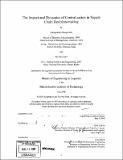The impact and dynamics of centralization in supply chain decision-making
Author(s)
Sohn, Tae-Hee; Rangavittal, Guruprakash (Guruprakash Coimbatore)
DownloadFull printable version (13.08Mb)
Alternative title
Economics of centralization in supply chain decision-making
Other Contributors
Massachusetts Institute of Technology. Engineering Systems Division.
Advisor
Chris Caplice.
Terms of use
Metadata
Show full item recordAbstract
Companies with a corporate supply chain department and multiple business units use one of two methods for their supply chain decision-making: centralized decision-making where supply chain decisions are made at the corporate level by the central supply chain department or decentralized decision-making where supply chain decisions are made at a business unit level. We investigate the hypothesis that a centralized organizational structure helps companies lower costs and a decentralized organization structure enables companies to quickly respond to customer needs on a real time basis and improve customer service. To evaluate our hypothesis we surveyed industry current practice. Based on our analysis from the survey, we identified three factors that influence companies to adopt either a centralized or decentralized organization structure: customer service, supply chain management cost, and organizational control. We identified that a "hybrid" structure, where strategic functions are centralized and operational functions are decentralized, had the lowest supply chain management cost percentage to sales.
Description
Thesis (M. Eng. in Logistics)--Massachusetts Institute of Technology, Engineering Systems Division, 2008. Includes bibliographical references (leaves 88-89).
Date issued
2008Department
Massachusetts Institute of Technology. Engineering Systems DivisionPublisher
Massachusetts Institute of Technology
Keywords
Engineering Systems Division.